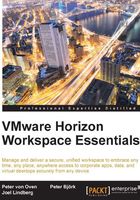
Horizon Workspace vApp
Horizon Workspace comes packaged as a vApp, which means that it's a number of preconfigured virtual machines in a single file with the extension OVA. (The OVA extension is a standard way of packaging a vApp).
There are many benefits with this type of deployment. The vApp is preinstalled with the operating system (Horizon Workspace is based on SUSE Enterprise Linux (SLES)) along with all the components that make up Horizon Workspace. The only thing you need to do is to configure the unique settings in your environment. There is no operating system to install and no installer to run.
Use a naming convention that makes sense to you and is consistent throughout your environment. For a test environment you can keep the default appliance names, but for production, it would make sense to name them, so that they are meaningful to your environment and also as one of the appliances will be the address that your users will use to connect.
Choose your hostnames and enter them into your DNS server along with the associated IP addresses. During the installation process, the appliances will perform a reverse lookup in DNS to determine (resolve) what their hostname is.
An overview of vApp
As we previously discussed, Horizon Workspace is comprised of five virtual appliances as shown in the following diagram:

The five virtual appliances (va) are described in the following list:
- gateway-va
The Horizon Workspace Gateway is the single entity for all end user communication. All user requests hit the gateway-va virtual machine, which then routes the request to the appropriate virtual appliance. The Gateway appliance offers a single namespace for accessing the Horizon Workspace implementation.
- configurator-va
Horizon Workspace is configured using this virtual appliance, so this appliance configures all the other appliances. It has both a console and a web interface. Any configuration changes you make with the configurator are then distributed to the other virtual appliances within the vApp automatically, for example, SSL-certificates and root passwords.
- service-va
Horizon Workspace uses a standard named SAML for authentication of users and to extend the identities, which is explained in more detail in Chapter 4, Integrating SaaS Applications. The service-va controls this function and also provides the frontend for the Administrator Web interface.
- connector-va
The Horizon Workspace Connector provides the following services: user authentication (identity provider), directory synchronization, ThinApp synchronization, and View pool synchronization.
- data-va
This virtual appliance controls file storage and sharing service, stores users' files and folders, and synchronizes them across multiple devices. The data-va also hosts the end user web portal. We will cover the functionality of this appliance in Chapter 3, Horizon Files.